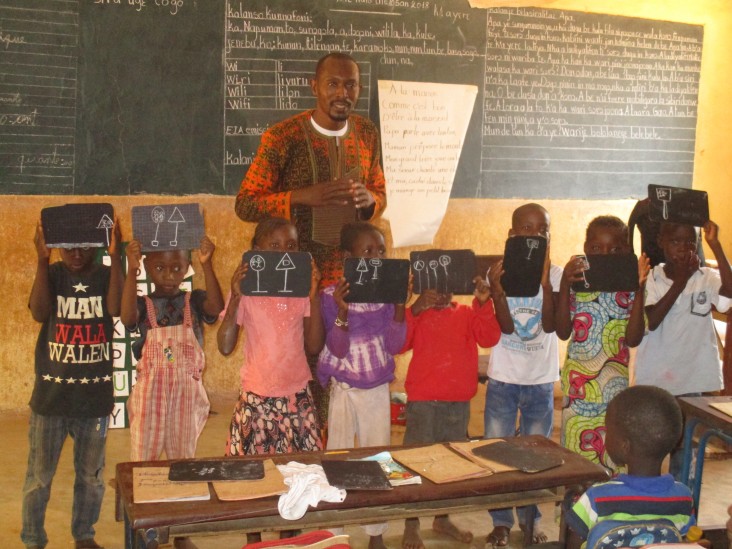Speeches Shim

Thanks to USAID/Mali SIRA’s Balanced Literacy and decodable words approach, teachers are able to teach the sounds of letters more efficiently and to better organize their classes. Thus, students’ reading and writing skills are improving.
November 2018 – In Moribabougou, a suburb of Bamako, many parents of students were unreceptive to teaching in national languages and using the balance literacy. Moreover, the educational innovations promoted by this literacy approach were not always appreciated or understood. This situation drove some parents to remove their children from Moribabougou Primary School when USAID’s Selective Integrated Reading Activity (SIRA) project was launched in February 2016. There were very few new enrollments. The situation was worsened by the lack of interest shown by some teachers in the area, who were set in their old beliefs. For example, they believed that a child could not master the alphabet before grade 3 or that it was necessary to memorize a text to be able to read it.
Balanced literacy in Mali is a complete program of reading and writing, producing text as opposed to calligraphy, that “balances” decoding and comprehension, reading and writing activities, children’s needs and curriculum requirements, discovery and direct teaching as well as games and individual work. This approach enables children to acquire all the skills they need to develop as fluent, autonomous readers and writers.
Despite these challenges, SIRA continued its training, monitoring and provision of teaching materials, which include interesting illustrated little stories, leveled texts and interactive audio lessons. After only a few months of implementation, the project began to see some positive changes in the mentality and beliefs of parents, teachers, and even students outside SIRA schools. As early as April 2017, Abdoul Aziz Fane, grade 1 public school teacher, explained: “Many children often come to see me, willing to join my class.”
“When SIRA arrived, I wrote to the Teaching Supervisory Center, and requested they do not implement the balanced literacy approach in our school. Today, given the very positive results, my strongest wish is that this project continues supporting our schools.” - Bréhima Diarra, President of the School Management Committee, Bandiougoubougou
Gradually, some teachers, who were previously unreceptive to the approach, began to show interest. Given the positive results, the most skeptic began to subscribe to the approach. Abdoulaye Diakité, school director, is amazed: “Students in grade 1 and 2 of SIRA classes learn many things that their counterparts in other schools tackle only in grade 3 and 4, and even beyond. Their skills in writing, reading and oral expression have improved; moreover they are more open-minded and more relaxed.” According to him, the project should extend the balanced literacy approach to grade 6 as well. “I understand the project’s intention to consolidate students’ level in grade 1 and 2, but I would like teachers to continue teaching their students until grade 6; otherwise, the momentum may slow down or be stifled as students move to upper classes.”
This innovative approach—implemented by the five-year USAID/Mali SIRA activity—has improved teaching-learning of reading and writing in the most dominant language Bamanankan for more than 264,000 students from grade 1 and 2 in public and community schools in Koulikoro, Sikasso, Segou and Bamako.

Comment
Make a general inquiry or suggest an improvement.